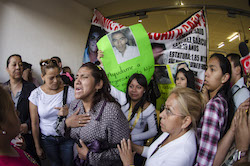The conviction of three men involved in a prominent Mexico City massacre marks the official conclusion to a case that called attention to rising crime and judicial shortcomings in the country’s capital.
According to Milenio, a federal judge ordered 520-year sentences for Ernesto Espinosa Lobo, Jose de Jesus Carmona Aiza, and Victor Manuel Torres Garcia for their involvement in the so-called “Heaven” case, a massacre that gripped Mexico’s attention in 2013. In May of that year, thirteen youths were kidnapped from a bar named Heaven in Mexico City’s Tepito neighborhood, and then murdered. Their bodies were found in a mass grave in August 2013.
Over twenty suspects were detained during the subsequent investigation, while authorities gave conflicting explanations as to what was behind the killings. In September 2013, a local police officer was arrested in connection with the murders. Then, in May 2014, authorities arrested Javier Rodriguez Fuentes, alias “El Javi,” suspected of being the main conspirator behind the crime.
Despite the convictions, the case remains open to further investigations into other suspects, according to Univision.
InSight Crime Analysis
The Heaven investigation revealed two important issues concerning crime in Mexico City. First, the case highlights the growing threat of organized crime in the nation’s capital. Mexico City has typically been viewed as immune to the cartel wars seen elsewhere in the country, with authorities repeatedly downplaying the presence of top-tier organized crime groups in the capital. This is despite increased violence: Mexico City saw a 21 percent uptick in homicides during the first eight months of 2015, according to The Wall Street Journal.
While authorities have continually stated that the Heaven massacre was not tied to organized crime, Mexican officials and organized crime experts have expressed skepticism towards these claims. According to investigators, El Javi was a leader of La Union de Insurgentes, a local Mexico City gang. The Heaven killings are believed to have been the result of fighting between La Union and another local drug gang, known as the Tepito Cartel, over drug sales. Both groups have ties to larger criminal organizations, including the Familia Michoacana and the Beltran Leyva Organization (BLO), respectively. Arguably, La Union’s rise in Mexico City has done away with the capital’s reputation as a peaceful haven, unaffected by intra-cartel violence.
SEE ALSO: Mexico News and Profiles
Secondly, the Heaven case has been fraught with investigative errors, accusations of police involvement in the crime, and an overall lack of clarity as to what really happened that night, despite the recent convictions. All of this exemplifies Mexico’s ongoing challenges in cleaning up its judiciary.
At least four Federal District police officers were arrested as part of the investigation into the Heaven massacre, prompting the city’s human rights commission to demand an “in-depth” investigation into what role police may have played in the crime. At the time, the human rights commission also said that investigators had not respected the concerns of the victims’ families, regarding independent analysis of the bodies. Following the convictions, families of the victims have said it is still not clear why the youths were killed.
As noted by newspaper El Pais, many of the investigative shortcomings of the Heaven case mirror problems in the Iguala investigation — in which 43 students disappeared after clashing with police. So while the three convictions secured in the Heaven case looks like a victory for Mexico’s judiciary, it wouldn’t be unreasonable to wonder whether authorities probed as diligently and as deeply as they could have.

